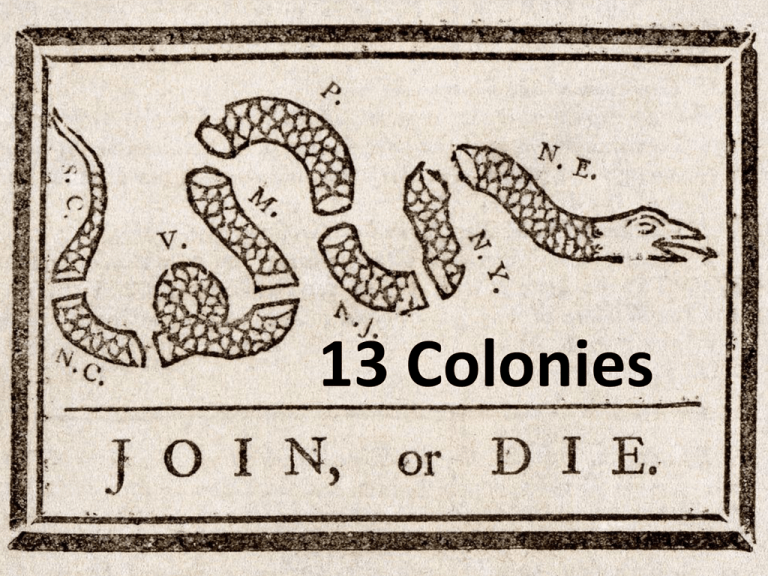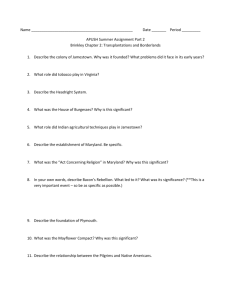13 Colonies What is a colony?
advertisement

13 Colonies What is a colony? • A colony is a place (land) and people (called subjects) that is controlled by another country –Imperialism • Great Britain had colonies all across North America. 13 total True or False? • People living in a colony usually had the power to create their own laws and government. True or False? • People living in a colony usually had the power to create their own laws and government. FALSE Why did countries conquer each other? • To build EMPIRES – E: economic – M: military – P: political – I: ideological – R: religious – E: exploratory Economic Motivation • Mercantilism – Dominant economic theory/practice of Europe for most of the 16th-18th centuries – Economic nationalism for the purpose of building a wealthy and powerful state – Strict regulation of imports, encouragement of exports • Mercantilism motivates colonial expansion Religious Motivation • Escape Persecution – Massachusetts – Maryland – Pennsylvania – Rhode Island Puritans Catholics Quakers All religions • “liberty of conscience” Where exactly were the colonies? • New England (Northern) Colonies • Middle Colonies • Southern Colonies Who made up the colonies? • Lets take a closer look at the kinds of people who came to the New World • We examine actual passenger lists from 2 ships – 1 ship travelled to Virginia (southern) and the other went to New England – Work to complete the “Examining Passenger Lists” handout independently or with a partner Passenger List Debrief • What are the biggest differences between the two ships? • What does this info tell you about the diff. between New England and Virginia in the 1630s? • What more do you want to know about these passengers? • What info is missing from these lists? • What do you think will change once plantation owners in the Chesapeake begin replacing indentured servants w/ African slaves? New England Colonies New England Colonies • Describe a typical immigrant… • What was the original purpose of this colony? – Religious freedom • What religion were the people living here? – Separatists (also called Puritans) • What was the economy like? – Small, family farms – Skilled craftsmen (ship building, weavers, tailors, etc.) – TRADE became very important • Was slavery allowed? – Some families had slaves (at first); outlawed by 1780’s Middle Colonies Middle Colonies • A typical immigrant… • What was the original purpose of this colony? – Economics: fur traders sold animal fur to British – Also, the Quakers founded Pennsylvania (freedom) • What religion were the people living here? – No official religion (many people were Quakers) • What was the economy like? – Farming (“staple crops” like wheat, barley, oaks) – Trade was important, port cities like NY and Philadelphia • Was slavery allowed? – Slaves were more important than in NE, less important than in the South – Many indentured servants were used Southern Colonies Southern Colonies • A typical immigrant… • What was the original purpose of this colony? – Money! – Founded by joint stock companies • What religion were the people living here? – Anglican (Church of England) • What was the economy like? – Cash crops (cotton and tobacco) • Was slavery allowed? – Slavery was very important in the Southern colonies – Many indentured servants were used as well Compare & Contrast: Jamestown vs. Plymouth Jamestown Plymouth (Southern) (NE) Compare & Contrast: Jamestown vs. Plymouth Plymouth Jamestown Founded in early 1600’s Founded: 1606 Purpose: Make money! Regional Characteristics: Warm, humid, swamp-like Main crop: Tobacco Who came? Young men, indentured servants Founded: 1620 Large % of population died during first winter Purpose: Religious freedom Native Am. helped with survival Main crop: Corn Regional Characteristics: COLD winters, not great for farming Who came? Entire families



